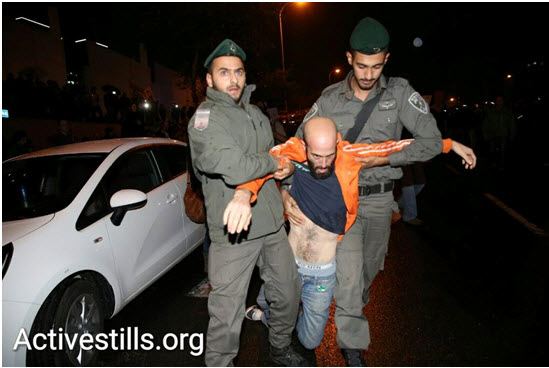The Association for Civil Rights in Israel (ACRI) has petitioned the Acting Chief Police Commander, Bentzi Sau and demanded an end to police violations of the freedoms of assembly, association, and speech being directed towards those protesting the gas deal. In its petition the ACRI states: “It is the role of Israel’s police force to protect the freedom of assembly; however inquiries received by ACRI over the last few days indicate that the just the opposite is happening.”

An activist arrested in the demonstration against the “gas deal” in Tel-Aviv, November 7, 2015 (Photo: Activestills)
The police demand that the organizers of protests bear individual, criminal responsibility for disturbances that occur during or after demonstrations. These demands, as well as additional requirements that have been imposed upon the organizers of protests, are illegal. The riots that developed during the protests in Be’er Sheva and Tel Aviv last Saturday were not initiated by the organizers of the demonstration, some of whom were not even present at the time.
More protests against the gas deal are planned for Saturday night, November 14, in Tel-Aviv, Jerusalem, Haifa, Beer-Sheva, Hadera, Kiryat Shmona, Nazareth, Modi’in, Kfar Sava, Raanana, Rosh Pina, Mevasseret Tzion and Kfar Yona. According to ACRI, it is the Acting Chief of Police’s responsibility to instruct all police stations across the country to avoid placing illegal conditions on the organizers of the demonstrations that infringe upon the freedom of speech and the freedom of assembly. If the police continue to impose these conditions, ACRI will demand that the police explain their reasons for doing so. According to Sharona Eliahu-Chai, an attorney for the ACRI, while the petition submitted to the police specifically addresses the current protests against the gas deal, it is equally relevant and applicable to all social and political demonstrations.


